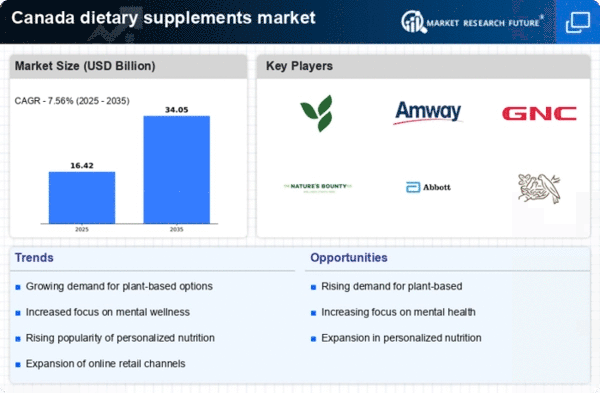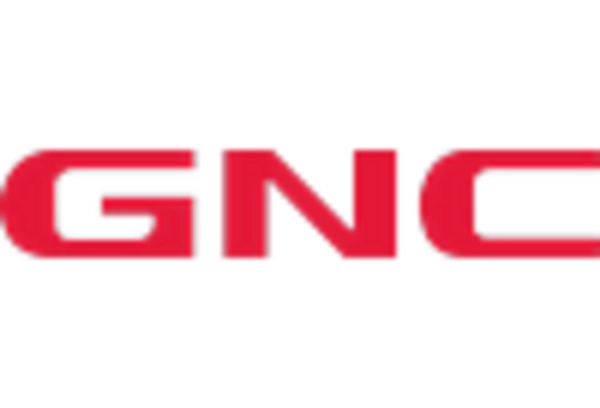Aging Population
Canada's demographic shift towards an aging population is significantly impacting the dietary supplements market. As the proportion of seniors increases, there is a heightened focus on health maintenance and disease prevention among older adults. Statistics suggest that individuals aged 65 and older are among the largest consumers of dietary supplements, often seeking products that support joint health, cognitive function, and overall vitality. The dietary supplements market is adapting to this demographic trend by offering specialized formulations tailored to the needs of older consumers. This includes products rich in omega-3 fatty acids, calcium, and vitamin D, which are essential for maintaining health in later years. The growing aging population is expected to drive sustained growth in the dietary supplements market, as more seniors turn to these products to enhance their quality of life.
E-commerce Expansion
The rapid expansion of e-commerce in Canada is reshaping the dietary supplements market. With the convenience of online shopping, consumers are increasingly turning to digital platforms to purchase dietary supplements. Data indicates that online sales of dietary supplements have grown by over 30% in recent years, reflecting a shift in consumer behavior. This trend is particularly pronounced among younger consumers, who prefer the ease of accessing a wide range of products from the comfort of their homes. The dietary supplements market is responding by enhancing online presence and offering exclusive online promotions. Additionally, the rise of subscription services for dietary supplements is further driving this trend, as consumers seek convenience and personalized options. The continued growth of e-commerce is likely to play a crucial role in shaping the future landscape of the dietary supplements market.
Growing Health Consciousness
The increasing awareness of health and wellness among Canadians appears to be a primary driver for the dietary supplements market. As individuals become more informed about nutrition and its impact on overall health, the demand for dietary supplements has surged. Reports indicate that approximately 70% of Canadians actively seek ways to improve their health, leading to a notable rise in supplement consumption. This trend is particularly evident among younger demographics, who are more inclined to incorporate supplements into their daily routines. The dietary supplements market is thus experiencing a shift towards products that promote preventive health measures, such as vitamins, minerals, and herbal supplements. This growing health consciousness is likely to continue influencing purchasing decisions, as consumers prioritize products that align with their wellness goals.
Increased Focus on Mental Health
The growing emphasis on mental health and well-being is emerging as a significant driver for the dietary supplements market. Canadians are increasingly recognizing the importance of mental health, leading to a surge in demand for supplements that support cognitive function and emotional well-being. Products containing ingredients such as omega-3 fatty acids, B vitamins, and adaptogens are gaining popularity as consumers seek natural solutions to manage stress and anxiety. The dietary supplements market is responding to this trend by developing innovative formulations that cater to mental health needs. Research suggests that nearly 40% of Canadians are actively seeking supplements to enhance their mental well-being, indicating a robust market potential. This focus on mental health is expected to continue influencing consumer preferences and purchasing behavior in the dietary supplements market.
Rising Interest in Clean Label Products
The increasing consumer demand for transparency and clean label products is significantly influencing the dietary supplements market. Canadians are becoming more discerning about the ingredients in their supplements, favoring products that are free from artificial additives and preservatives. This trend is reflected in the growing popularity of organic and non-GMO supplements, as consumers seek products that align with their values and health goals. The dietary supplements market is adapting by reformulating products to meet these clean label standards, ensuring that ingredient sourcing and manufacturing processes are transparent. Approximately 60% of consumers express a preference for supplements with clear labeling and minimal processing. This rising interest in clean label products is likely to shape the future of the dietary supplements market, as brands that prioritize transparency may gain a competitive edge.

















